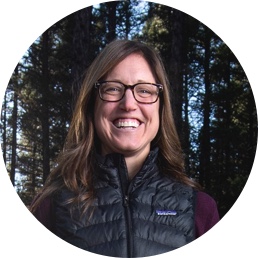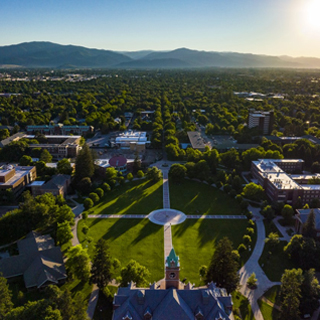S.E.A. Change Faculty Spotlight: Libby Metcalf

Libby Metcalf specializes in the ways humans interact with the natural environment, specifically how Montanans explore their own landscape. As an associate professor in UM’s W.A. Franke College of Forestry & Conservation, she provides oversight on how state agencies like Montana Fish, Wildlife and Parks can promote the human perspective of wildlife, while she teaches a full class load, directs Montana outdoor recreation plans and UM’s Parks, Tourism and Recreation Management program, and co-chairs UM’s Department of Society and Conservation while serving on several committees on campus. In between these obligations, Metcalf mentors students and works to advance the mission of S.E.A. Change at UM.
Montanan: Much of your research is centered on making the outdoors accessible by eliminating barriers to recreation. Much of that work naturally echoes the S.E.A. Change movement on campus. How do you view your role in the social movement?
Metcalf: I am a woman, mom, wife, professor, mentor, sister, scientist, friend and colleague. All these traits make me uniquely poised to be part of this social movement. In fact, the thing I love about S.E.A. Change is that everyone, regardless of background, is part of the movement. I believe many of us on this campus are promoting S.E.A. Change without actually realizing we are; our students, staff and faculty are all making UM a more habitable place for women.
I see natural linkages between S.E.A. Change and my own research focused on connecting the outdoors to all. I believe everyone has the right to go outside and experience all that Montana has to offer. This can mean creating accessible outdoor recreation areas or providing opportunities for underrepresented groups to experience a new activity. However, the most relevant S.E.A. Change research I conduct is focused on female hunters, specifically trying to understand the constraints they face and how they negotiate through them. Women are the fastest growing demographic in hunting despite research about the topic being underfunded and understudied. My hope is that I can be part of S.E.A. Change and elevate the need in science to continue these fascinating areas of research.
Montanan: UM students speak highly of receiving academic advising from you, particularly citing your guidance on job prospects. Many female students report that your advice on salary negotiation is immensely helpful. What have you gleaned from these conversations when it comes to female students being prepared for a critical moment in burgeoning careers?
Metcalf: I’m interested in ensuring my female students know the challenges that are before them and the rights they have to equity and fairness while at UM and in their future careers. For my undergraduate students, I want to empower them and help build confidence to seek jobs in a male-dominated profession. This means I spend a lot of time talking with my female students to understand their challenges, promoting them beyond the classroom and helping them find internships and jobs with employers that provide a safe and empowered atmosphere. I also train all my students on the importance of diversity in natural resource and recreation management by creating conversations about gender, culture, disabilities, the senior population, income and more.
Most of my graduate students right now happen to be female and they have pushed me to clearly articulate the challenges that lay before them. We’ve had very honest conversations about how to negotiate salary, what to do when you are not being treated fairly, how to straddle the fine line women face of being assertive but not “bossy,” and workplace communication. The S.E.A Change movement is about opening up these conversations to the larger campus community, sharing frustrations, but also figuring out solutions.
Montanan: You’ve co-taught a Hunting for Sustainably course, where students are instructed how to hunt, dress and prepare wild game. That’s an empowering skill set for anyone. Do you view competent field skills as a form of leadership?
Metcalf: A critical component of leadership is self-efficacy and social support, so that people can feel like they have the confidence to be a leader and the right people around them who will support their efforts. That is exactly what we are teaching in our Hunting for Sustainability class. Josh Millspaugh, my co-instructor, and I want our students leaving confident and feeling like they have a network of people around them who support them. We are not necessarily interested in creating new hunters; rather, we are more interested in creating stewards of hunting. Because of this, we are able to focus on deeper challenges associated with hunting like fears, confidence, values and ethics while also building skills like firearm safety and butchering. Our female students in the class have been exceptional. Some of our early students just sent me a photo of their first bucks! They were on a hunting mentorship weekend with UM’s Backcountry Hunters and Anglers student club. What was amazing to me was that they did it together and they felt confident in sending a picture to me. I had a mixture of emotions… pride, excitement, and deep gratitude for getting to be part of their experience. The women I teach are part of the S.E.A Change.
Montanan: As UM employs S.E.A. Change, how does your experience as a working mother in academia contribute to powering a societal change for the betterment of all people? (Metcalf and her husband, Alex Metcalf – also a faculty member in the college – have two young children.)
I have had many people say to me, “Wow, how do you do it?” or “You have great work-life balance.” This, is of course, a myth and I am honest about that with folks. I work long hours, I stress out and I often feel like I am failing at absolutely everything. But for me, part of S.E.A Change is being honest about that. It’s hard, it’s a slog sometimes, but if you want to the world to change you have to be willing to commit to it over an extended period of time.
Before coming to UM I didn’t realize that women in academics can have families. This was an exceptional revelation for me. I was able to surround myself with colleagues on campus who also valued this and knew how to best negotiate the system. In particular, I was able to have honest conversations with my promotion and tenure committee and they were the ones who encouraged me to chart my own path. So, during rank advancement to associate professor and the tenure process, Alex and I decided to have two babies. Recently I was at a conference and someone noted they hadn’t seen me in the past few years. My response was “I was having babies and getting tenure.” Alex and I laugh at this now, but if it wasn’t for the support of my colleagues and my husband, I wouldn’t have been able to achieve this level of success.
My hope is that sharing stories, empowering women, creating safe spaces and encouraging all people to work toward equality will eventually create the S.E.A Change the UM community wants and needs.
